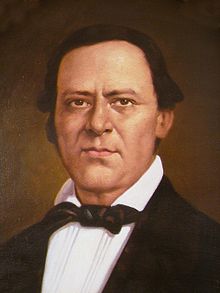Francisco María Oreamuno Bonilla
Francisco María Oreamuno Bonilla (born October 4, 1801 in Cartago , † May 23, 1856 in San José ) was Jefe de Estado of Costa Rica from November 29, 1844 to June 7, 1846 .
Life
His parents were Justa de Bonilla y Laya-Bolívar and Isidro de Oreamuno y Alvarado.
On June 7, 1827, he married in Carthago, Agustina Gutiérrez y La Peña-Monje, the daughter of Josefa de La Peña-Monje y La Cerda and Agustín Gutiérrez Lizaurzábal . Four children were born in this marriage: María Esmeralda, Francisco José, Jesús María y Salvador Oreamuno y Gutiérrez. In Cartago he studied Latin grammar with the priest Hipólito Calvo Rosales and humanities with a Bachelor of Rafael Francisco Osejo.
He was politically active among the Republicans of Cartago. In 1824 he was Juez de Minas , in 1826 he became the third mayor of Carthago. Third From 1826 to 1828 he was a deputy for Carthago.
From 1826 to 1827 he was a member of the Court of Auditors. In 1831 he was city councilor and district administrator of the municipality of Cartago. From 1831 to 1838 he was a customs officer of the Central American Confederation in Puntarenas. In 1838 and 1842 he was Minister General, and in 1838 he was the permanent representative of Costa Rica in Nicaragua. In 1841 he was judge of the first instance of Cartago. From 1843 to 1844 he was a member of the constituent assembly. From 1843 to 1844 he was deputy Jefe de Estado . In 1847 he was Minister for War and the Navy. From 1849 to 1850 he was governor of Cartago. From 1850 to 1856 he was deputy president and chairman of parliament. In the 1844 elections, the Jefe de Estado was no longer elected by the Cabildos , but by direct election. Francisco Maria Oreamuno Bonilla won over incumbent José María Alfaro Zamora and 29 other candidates. He took office on November 29, 1844 and submitted on November 17, 1844 his resignation which was not accepted and was replaced by Rafael Moya Murillo (1844-1845) and José Rafael de Gallegos y Alvarado (1845-1846) and he retired to Cartago.
In April 1845 the parliament deposed him and initiated criminal proceedings for leaving the post, but he remained president until June 7, 1846, when José María Alfaro Zamora broke the constitution with a military coup and usurped the office .
Oreamuno was the owner of the expensive real estate in the province of Cartago, he dedicated himself to growing coffee and raising cattle. He was a correspondent for the weekly La Paz y el Progreso . He died of cholera while presiding over parliament and serving as vice president. In 1914, a canton of the province of Cartago with the canton seat San Rafael, Oreamuno was named.
Jesús Jiménez Zamora, his son and Ricardo Jiménez Oreamuno, his grandson, also became Presidents of the Republic.
Individual evidence
- ↑ Jorge Francisco Sáenz Carbonell, Los años del voto directo: Don Francisco María Oreamuno y la Constitución de 1844 , EUNED, 1992, 276 p., P. 66
- ↑ Jorge Francisco Sáenz Carbonell, Francisco María Oreamuno , EUNED, 1994, 123 pp., 66
| predecessor | Office | successor |
|---|---|---|
| José María Alfaro Zamora |
Presidents of Costa Rica November 29, 1844 - June 7, 1846 |
José María Alfaro Zamora |
| personal data | |
|---|---|
| SURNAME | Oreamuno Bonilla, Francisco María |
| BRIEF DESCRIPTION | President of Costa Rica |
| DATE OF BIRTH | October 4, 1801 |
| PLACE OF BIRTH | Cartago |
| DATE OF DEATH | May 23, 1856 |
| Place of death | Cartago |
